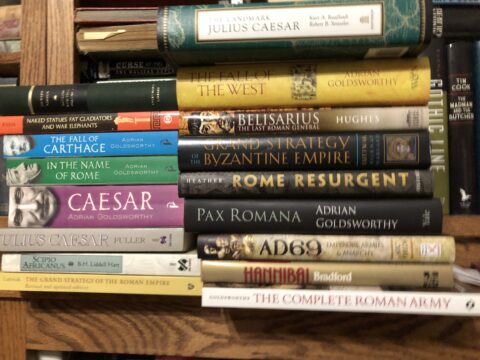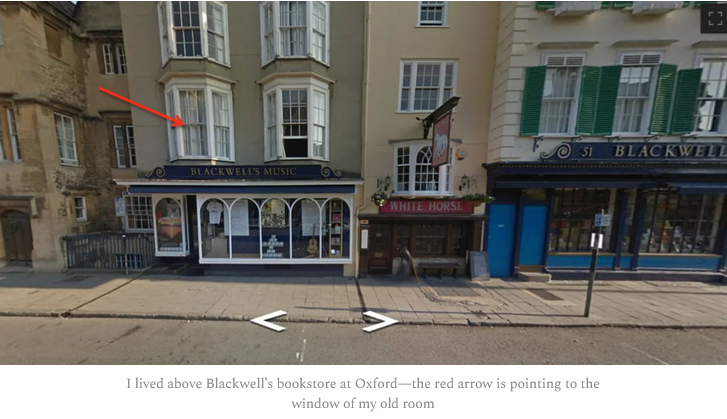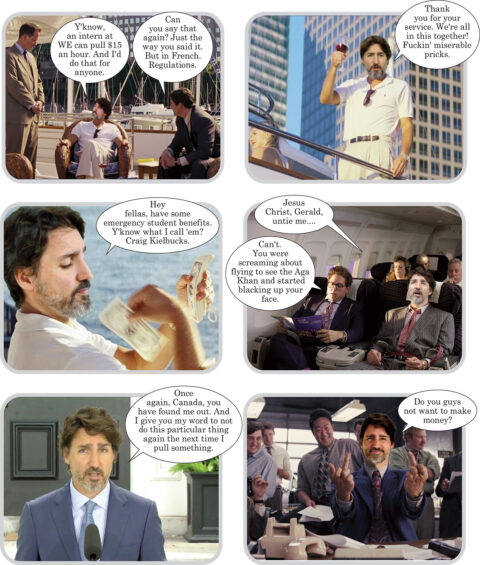I hesitate to admit that I don’t read as much as I once did. A few years ago, it wasn’t uncommon for me to read anywhere between 50 and 100 books per year, but my pace is much slower now. Partly it’s because I’m spending most of my time at home with the internet within easy reach and partly it’s because I’m one of those weird people who prefer to own the books I read (Rob Henderson has this quirk as well, I learn). A lack of income also impacts the ability to buy books for some reason.
That throat-clearing aside, here’s Rob Henderson‘s approach to reading:

Some books I had handy when that silly social media “how often do you think about Rome” question was being bandied about.
People sometimes ask me, “Rob, how do you read so much?” or “How many books do you read simultaneously?” or “What is your reading plan?” or even “How do you get through so many books, are you a speed reader?” (I’m not).
Readers and Twitter/X followers see how frequently I post my readings or see my recommended books and assume there must be a secret.
There’s no secret.
I read pretty slowly. I take notes, I underline, I highlight, I jot my thoughts in the margins, I pause if I encounter an especially interesting passage or idea.
Years ago, I read How to Read a Book by Mortimer Adler. He described reading a book as being “in conversation” with the author. But reading has the added benefit of allowing you to concentrate deeply, move as fast or as slowly through an argument or idea as you want, and formulate and reformulate your thoughts as you move through the text.
In a given year, I read about 40-50 books cover to cover, read excerpts and chapters of perhaps another 100 or so, and skim many more. I also read psychology papers and other academic texts.
I read multiple books concurrently. Typically 2 or 3 physical books I cycle through, with one I devote most of my attention to. I also have 2 other books I read on the Kindle app on my phone. Waiting in line at the store. In between sets at the gym. Traveling on the train or an uber. All this time adds up. You can spend 5 or 10 minutes scrolling, or read a couple of pages of a good book. I recommend the latter.
What about audiobooks? I like this post from Naval Ravikant:
He’s right.
Reading requires a lot of effort and practice. Hearing language versus reading it engages different mental processes. Reading forces you to move more slowly. If an author explains an idea to you, the constraints of natural conversation mean that you can’t just pause for 10 minutes while you think deeply about what he or she just said and then subsequently resume the discussion. Books enable you to do that. Of course, you can pause on audiobook and think about what the author just said. Often, though, listening to audiobooks is accompanied by other tasks, making it harder to devote 100% of your attention to the ideas being discussed or the story being told.
Listening to audiobooks is easier. And it’s better than nothing. But if you want to seriously engage with ideas and increase the likelihood that you’ll retain knowledge, it’s better to read.
Some people just love audiobooks, but I’ve rarely found them to be a positive experience: either it grabs my attention and I can’t do anything else or it fails to grab my attention and I don’t really retain much of what I’ve heard. Multitasking and I are not compatible.







